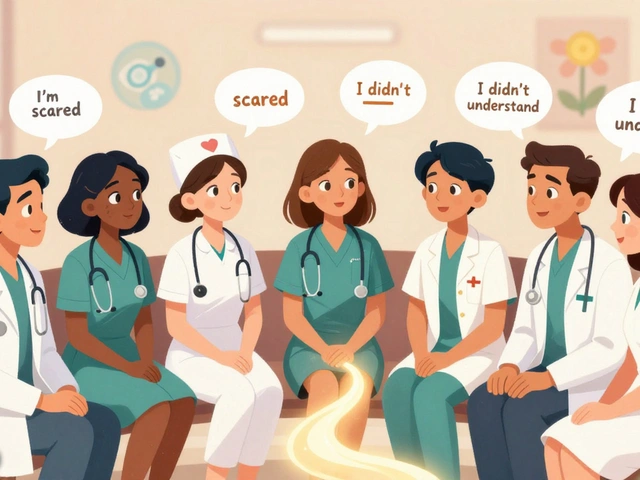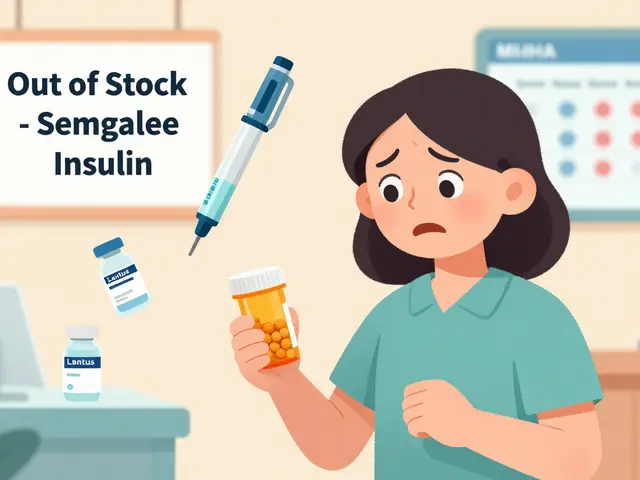Have you ever wondered if a person's past can shape their mental health? When it comes to tough conditions like schizophrenia, the connection with trauma might be greater than you think. It turns out that past traumatic experiences can sometimes play a significant role in triggering or worsening schizophrenia symptoms.
Schizophrenia is often misunderstood, seen only as a genetic jigsaw. But researchers have been digging deeper, and some findings suggest that trauma - especially during vulnerable periods like childhood - might be a piece of the puzzle too. It's like a hidden layer, making it essential for us to consider the impact of trauma in mental health discussions.
Why does this matter? Knowing the link means we can better support those struggling. If you're someone who has faced trauma or knows someone affected, understanding these connections can make a world of difference in how we approach healing and support. We'll explore this complex relationship and offer practical tips to help navigate it.
- Understanding Schizophrenia
- How Trauma Affects Mental Health
- Linking Trauma and Schizophrenia
- Practical Tips and Support
Understanding Schizophrenia
Alright, let's get into what schizophrenia really is. You might have seen it in movies or heard about it in passing, but it's often portrayed inaccurately. Schizophrenia is a chronic brain disorder that affects how a person thinks, feels, and behaves. People with this condition might seem like they've lost touch with reality, which can be really scary for them and those around them.
One essential thing to know is that schizophrenia isn't about having a split personality; that's a common mix-up. Instead, it's more about disruptions in cognition and emotions, which can lead to impaired judgment and behavior. Common symptoms include hallucinations, such as hearing voices, delusions, and trouble with thinking clearly or concentrating.
Who Does Schizophrenia Affect?
Wondering who can get schizophrenia? Mostly, it kicks in during late adolescence or early adulthood, though it can start at any age. Genes play a big role, so it often runs in families. But environmental factors, like trauma, also contribute.
Some fascinating data shows it's a global phenomenon, affecting about 1% of the population worldwide. That’s roughly 1 in 100 people you meet! What's more, men and women are equally likely to get it, although men might start showing symptoms a bit earlier.
Different Stages and Types
Schizophrenia doesn’t just show up out of nowhere. It typically unfolds in stages. The first signs, known as the prodromal phase, might be subtle, like slight mood changes and social withdrawal. As it progresses, symptoms become more apparent.
- Paranoid: Most common, involves delusions and hallucinations.
- Disorganized: Slurred speech, confused behavior, and inappropriate emotions.
- Catatonic: Movement disturbances, from extreme agitation to not moving at all.
- Undifferentiated: Shows symptoms of all types without a clear category.
While understanding schizophrenia is complex, the more we know, the better we can support those affected. It’s all about recognizing the symptoms early and understanding that it’s a treatable condition, even if there's currently no cure.
How Trauma Affects Mental Health
Trauma isn't just about that one bad day. It leaves scars that might not be visible but can run deep, changing the way our minds react to the world. For many, significant events like abuse, violence, or severe accidents disrupt the brain's usual way of functioning, which can result in mental health struggles.
When trauma strikes, it's like hitting the panic button inside our heads, often leading to conditions like PTSD, anxiety, or depression. But did you know it may contribute to the development of schizophrenia too? The stress from trauma can influence brain structures, making them more vulnerable.
Impact on Brain Chemistry
The brain has an intricate balance of chemicals, and trauma can mix things up. In particular, it can affect neurotransmitters like dopamine, which are crucial in schizophrenia. This imbalance might help explain why some trauma survivors develop symptoms like hallucinations or delusions.
Stress and Its Chain Reaction
Traumas set off a stress response, which can go haywire. The continuous flood of stress hormones can keep the brain in a heightened state of alert, making it harder to calm down. This constant stress can pave the way for various mental health issues, including schizophrenia.
Early Exposure Risks
Particularly in childhood, trauma can warp development, impacting the brain during its most formative years. Kids experiencing trauma might face higher risks as they grow up, underscoring why early intervention is so vital.
Research reveals that individuals exposed to severe trauma are not only at risk for common mental health issues but might also face a greater likelihood of psychotic disorders.

Linking Trauma and Schizophrenia
When you think about schizophrenia, it's easy to focus on genetics, right? But here's an eye-opener: traumatic events can influence the onset or intensity of schizophrenia. Past experiences might be more relevant than we usually consider. Research suggests that people who have gone through significant trauma, like neglect or abuse in childhood, may be more susceptible to developing schizophrenia later in life.
The Role of Trauma
Trauma affects the brain in ways that can change how it functions long-term. Imagine a young mind trying to manage overwhelming stress or fear. The brain pathways involved in stress response can get twisted over time, making them more reactive. When this happens during critical developmental periods, it might lay the groundwork for disorders like schizophrenia.
There’s growing evidence that a history of trauma may not only increase the risk of mental health issues but also exacerbate their symptoms. Things like auditory hallucinations or delusional thinking might become more pronounced. It's as if trauma hits the 'fast forward' button on potential vulnerabilities, bringing them into sharper focus.
Research Insights
Studies have shown that people with schizophrenia are often more likely than the general population to report early-life traumas. Some researchers use what's called the 'trauma-dissociation model.' It suggests that extreme stress during formative years can lead to changes in perception and reality, which are common symptoms associated with schizophrenia.
| Types of Trauma | Increased Risk Percentage |
|---|---|
| Childhood Abuse | 25% |
| Neglect | 40% |
| Emotional Stress | 30% |
These percentages highlight potential correlations, but they're part of a bigger picture. Trauma is just one layer of many factors, including other environmental influences and genetic predispositions.
All of this points to the importance of paying attention to someone’s life story, not just their symptoms. Recognizing trauma's role in schizophrenia can open doors to more personalized treatment approaches.
Practical Tips and Support
Dealing with schizophrenia or supporting someone with it can be a daunting task, especially when you add trauma to the mix. Understanding the link between trauma and mental health can really help in finding effective ways to cope and heal. Here are some handy tips that might make a difference.
Get Professional Help
First things first, professional help is key. There are therapists and psychiatrists who specialize in trauma and schizophrenia. They can help navigate through the murky waters of mental health with therapeutic techniques like CBT (Cognitive Behavioral Therapy) or EMDR (Eye Movement Desensitization and Reprocessing).
Build a Support System
Never underestimate the power of support. Whether it's family, friends, or support groups, having people who understand what you're going through can make a massive difference. Think of it as having a personal cheerleading squad that lifts you up when things get tough.
Self-Care is Essential
Self-care isn't just a trendy word; it's vital. Making time for yourself with activities that promote relaxation, like meditation, yoga, or even a simple walk, can reduce stress levels. Remember, taking care of yourself isn't selfish—it's necessary.
Stay Informed
The more you know, the better. Educate yourself about schizophrenia and trauma. There are books, podcasts, and even online courses that delve into these topics. Knowledge is your best friend on this journey.
Explore Medication Options
If you're struggling with symptoms, talk to a doctor about medication. For some people, medication can help manage the symptoms of schizophrenia effectively. It's like finding the right tool for a specific job—the right medicine can sometimes be a game-changer.
With these tips, you're not just surviving; you're learning how to live a fulfilling life despite the challenges. Remember, every step forward counts, no matter how small.







7 Comments
Interesting post, thx for bringin it up. I think it's important to keep a respectful tone when discussing trauma and schzophrenia, since folks are often vulnerable. Knowing the link can help us create better support networks, and that feels like a step forward.
The neurochemical dysregulation model underscores trauma as an epigenetic accelerator for dopaminergic hyperactivity, thereby potentiating psychotic phenotypes.
The relationship between early trauma and later psychosis invites us to reconsider linear causality in mental health.
When a child endures chronic stress, the neurodevelopmental trajectory is altered in ways that echo throughout adulthood.
Such alterations are not merely biochemical; they sculpt the very architecture of perception and self‑identity.
Philosophically, this suggests that the self is a palimpsest, bearing the shadows of past injuries beneath its present narrative.
If we ignore these shadows, we risk treating symptoms in isolation, like patching a leaky roof without addressing the storm that caused the damage.
Research indicates that cortisol dysregulation from trauma can sensitize dopaminergic pathways, a hallmark in schizophrenia pathology.
Moreover, the lived experience of trauma can embed maladaptive schemas that later manifest as delusional thinking.
In therapeutic settings, acknowledging these schemas often opens a doorway to more compassionate interventions.
Clients frequently report that feeling heard about their trauma reduces the intensity of auditory hallucinations.
Conversely, when clinicians dismiss trauma as irrelevant, patients may retreat into deeper psychotic withdrawal.
This dynamic underscores the ethical imperative for clinicians to integrate trauma‑informed care into standard protocols.
From a societal perspective, destigmatizing the trauma‑schizophrenia link can foster community support networks.
Such networks, in turn, buffer stress and potentially mitigate the progression of psychotic episodes.
Critics argue that focusing on trauma shifts responsibility away from genetic factors, but the evidence points to a multifactorial model.
Embracing complexity does not dilute scientific rigor; it enriches our understanding of human vulnerability.
Ultimately, weaving trauma narratives into the fabric of schizophrenia treatment may transform suffering into resilient growth.
Man, the whole "research shows trauma leads to schizophrenia" is just the elite's way of diverting blame from big pharma. They're feeding us these narratives so we forget the hidden agendas about mind control experiments. If you look at the history, every major psychiatric breakthrough coincides with covert government projects.
While conspiratorial narratives can be tempting, we mustn't abandon empirical evidence in favor of sensationalism. Ethical discourse demands rigor over hysteria.
From a phenomenological standpoint, trauma operates as a rupture in the lifeworld, predisposing the subject to a schizophrenic horizon of meaning wherein pathological signifiers emerge.
Sure, because big words always solve mental health problems.